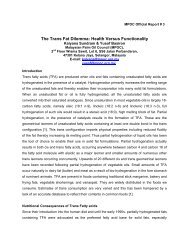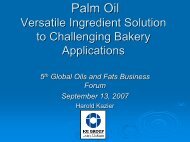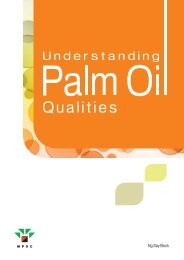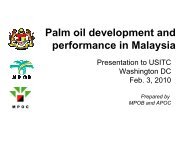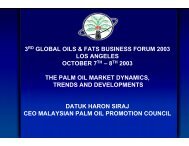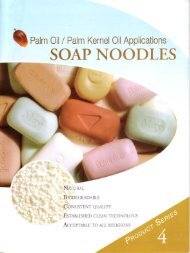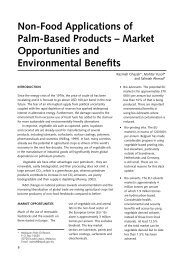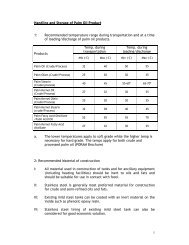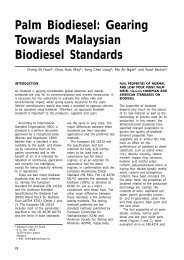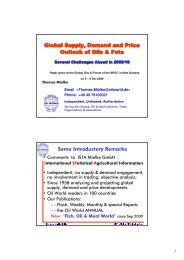ShippingWhen economics did not work in freight ratesThe past year was a complex one for the vegetable oiltrade. Who expected crude palm oil price to riseabove US$1,000/tonne CIF Europe, partly pushed upby demand for all commodities? Who expected the price ofbunker fuel to reach US$500/tonne, purely driven by risingcrude mineral oil prices?Who expected that, by the end of 2007, freight rates to Europewould be the same or even lower than at the end of 2006? Afteran initial jump in the first quarter of last year, the rates droppedoff and ended the year below those at the end of 2006 but justabove the January rates.This was totally unexpected. Basic economics indicate that, whenthe value of a commodity increases, the costs of the hardwareneeded to transport it increases.And if the cost of fuel increases,then the cost of transport to the market place increases.These economics do not work in the shipping industry, or atleast in the tanker industry. Certainly, these did not work in palmoil trade last year.Many years ago, there was a quotation, probably apocryphal, bya professor of transportation logistics. He maintained:“It is a wellknown fact that ship owners have very short memories, but it isa proven fact that tanker owners have no memorieswhatsoever.”This has been proven to be the case once again. Admittedly thechemical tanker market has been rather high for longer thannormal. This has not been due to the owners; they have beenordering new ships as fast as possible.The difference has been that all sectors of the shipping marketwere up at the same time, which has not happened before.Shipyards prefer to build bulk carriers; these are quicker to buildthan tankers and are much less complex.The owners, innovative as always, decided to meet lateexemptions to the new rules for carriage of vegetable oils byconverting older ships to double hull.China saw an opportunity and snapped up this business,converting about 100 ships in a relatively short time. It alsoexpanded the number of shipyards building simpler tankers, thusrelieving the pressure, and freight rates stayed at lower-thanexpectedlevels.GLOBAL OILS & FATS BUSINESS MAGAZINE • VOL.5 ISSUE 1, 200821
ShippingAnother factor contributing to the number of ships for thevegetable oil trade was the adaptation of many new shipsbeing built in China and Korea as product tankers.The ownersdiscovered that it was relatively cheap to meet the cargo tankstripping tests and to install the underwater slop dischargeoption while the ships were being built. These leave theshipyard with an IMO3 Certificate, albeit limited to vegetableoils.Lastly, double hull product tankers due for regular drydockings were converted cheaply for little money and no lossof time on the ships. Some of these were very large.The M/TMariella and M/T Maritina (now M/T Theresa Mediterranean),each of 77,770 deadweight (dwt), were the first and are nowowned by Wilmar.They were followed by four ships of around84,000 dwt, two more of these for Wilmar and operated byRaffles.Charterers’ innovationThe final factor that has reduced the freight rates has been thestrength of the trading companies. Wilmar, having bought Kuok<strong>Oil</strong>s and Grains palm oil business are believed to control about12 million tonnes of exported palm oil.They own, together withRaffles Ship Management, 19 ships including one due to becompleted this year.The average age of the 18 existing ships is21.5 years; although this will drop to 20 yrs 4 months when thenew ship is delivered (Table 1).On top of these ships, Wilmar has several on both long- andshort-term charter. Cargill and Pacific Interlink both have shipson charter for various periods.The result of their activities is that the producers do not have toworry too much about the freight market. If they cannot find aship, or if the ones they find are asking for higher freights, theycan abandon the idea of selling C&F and sell FOB instead. Notonly do they avoid all the problems and responsibilitiesconnected with chartering a ship and worrying about the cargoup to the final destination, they will also often receive the same,or better, net-back from selling FOB.IOI with its refinery in Rotterdam has also secured long-termfreight coverage at reasonable rates.Kwantas has its own ships, M/T Diana (9,306 dwt), M/T Dolphina(12,900 dwt), and M/T Doris (19,960 dwt). These ships, alreadyover 20 years old, are trading for Kwantas from East Malaysia toChina.In terms of smaller ships, many Thai vessels are now convertedto double hull and are trading to the east coast of India,Bangladesh, Sri Lanka, Myanmar, Vietnam and the Philippines.There are also some single hull ships still trading to these areasbut this is expected to end, as there will be enough coverage onships that comply with the regulations.22GLOBAL OILS & FATS BUSINESS MAGAZINE • VOL.5 ISSUE 1, 2008



